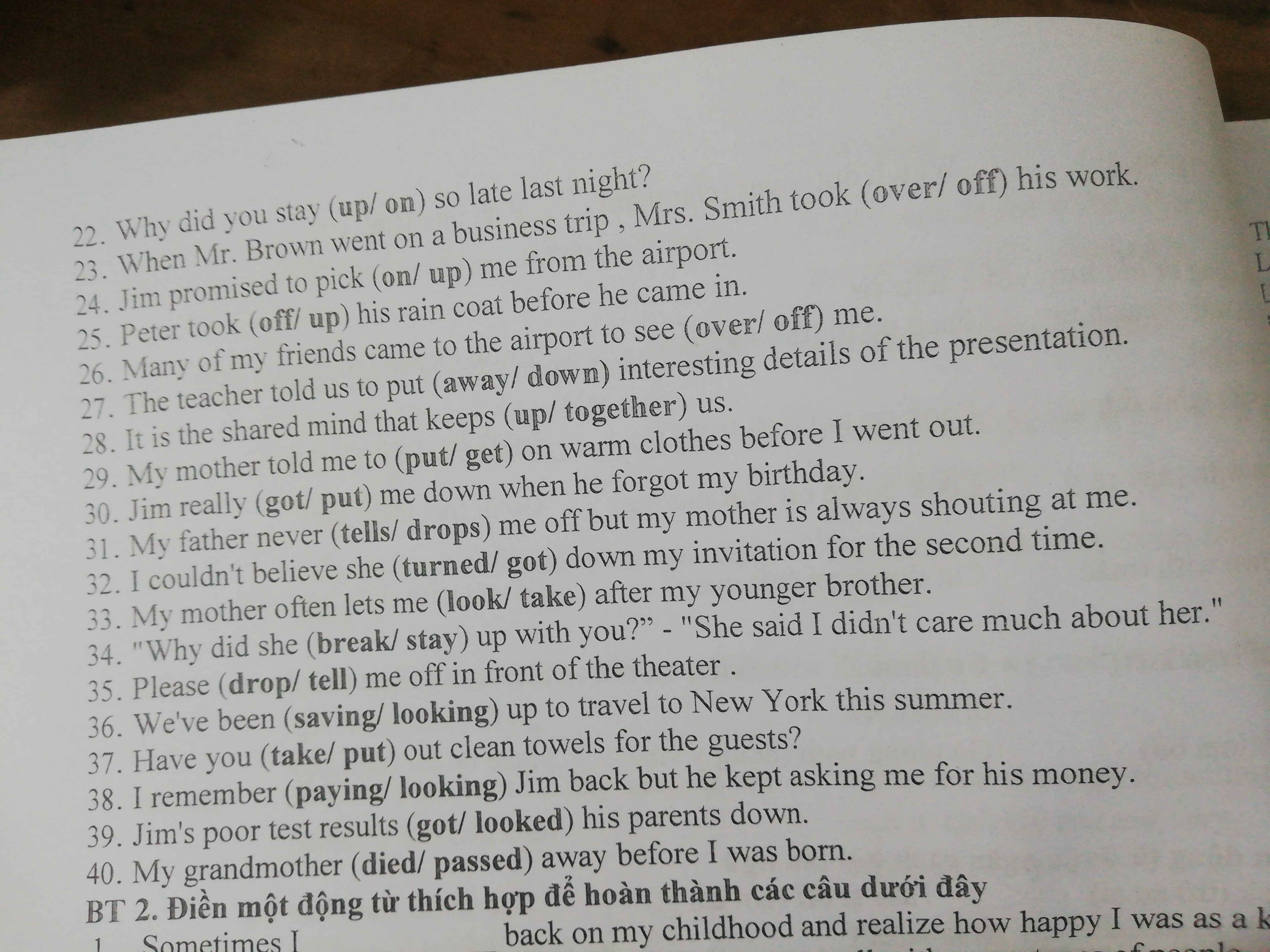PHRASAL VERBS


Những câu hỏi liên quan
VOCABULARY Match the phrasal verbs below with definitions 1-9. Is each phrasal verb separable or inseparable?Separable and inseparable phrasal verbsask sb out bring sth up call sth offcome across sth count on sbgive sth up hold sb up take after sb turn into sth1. stop doing something give sth up (separable)2. mention something3. be similar to somebody (a parent or older relative)4. rely on somebody5. delay somebody6. invite somebody to go on...
Đọc tiếp
VOCABULARY Match the phrasal verbs below with definitions 1-9. Is each phrasal verb separable or inseparable?
Separable and inseparable phrasal verbs
ask sb out bring sth up call sth off
come across sth count on sb
give sth up hold sb up take after sb turn into sth
1. stop doing something give sth up (separable)
2. mention something
3. be similar to somebody (a parent or older relative)
4. rely on somebody
5. delay somebody
6. invite somebody to go on a date (e.g. to the cinema)
7. find something accidentally
8. become something else
9. cancel something

1 stop doing something => give sth up (separable)
(ngưng làm gì đó => từ bỏ)
2 mention something => bring sth up (separable)
(đề cập đến cái gì đó=> đưa ra)
3 be similar to somebody (a parent or older relative) => take after sb (inseparable)
(tương tự như ai đó (cha mẹ hoặc người thân lớn tuổi hơn) => giống)
4 rely on somebody => count on sb (inseparable)
(dưa vào ai đó)
5 delay somebody => hold sb up (separable)
(hoãn ai đó => để ai đợi)
6 invite somebody to go on a date (e.g. to the cinema) => ask sb out (separable)
(mời ai đó đi hẹn hò (đi xem phim)) => mời ai đi đâu)
7 find something accidentally => come across sth (inseparable)
(tình cờ thấy cái gì đó => tình cờ gặp)
8 become something else => turn into sth (inseparable)
(trở thành cái gì khác => biến thành gì đó)
9 cancel something => call sth off (separable)
(hủy cái gì đó)
Đúng 0
Bình luận (0)
Circle the correct words to complete the Learn this! box. Use the examples in the box and the article to help you.LEARN THIS! Separable and inseparable phrasal verbsa Two-part phrasal verbs can be separable or inseparable. With separable phrasal verbs, the object can come before or after the particle (for, up, with, etc.).We must work out the answer.OR We must work the answer out.b When the object is a pronoun (her, it, them, etc.) it can only come 1 after/before the particle.We must work it out...
Đọc tiếp
Circle the correct words to complete the Learn this! box. Use the examples in the box and the article to help you.
LEARN THIS! Separable and inseparable phrasal verbs a Two-part phrasal verbs can be separable or inseparable. With separable phrasal verbs, the object can come before or after the particle (for, up, with, etc.). We must work out the answer. OR We must work the answer out. b When the object is a pronoun (her, it, them, etc.) it can only come 1 after/before the particle. We must work it out. c With inseparable phrasal verbs, the object always comes 2 after/before the particle, even when it is a pronoun. She looks after her dad. She looks after him. d Three-part phrasal verbs are always 3 separable / inseparable. We won't run out of energy. We won't run out of it. |
| 1. before | 2. after | 3. inseparable |
LEARN THIS! Separable and inseparable phrasal verbs
a Two-part phrasal verbs can be separable or inseparable. With separable phrasal verbs, the object can come before or after the particle (for, up, with, etc.).
We must work out the answer.
OR We must work the answer out.
b When the object is a pronoun (her, it, them, etc.) it can only come 1 after/before the particle.
We must work it out.
c With inseparable phrasal verbs, the object always comes 2 after/before the particle, even when it is a pronoun.
She looks after her dad. She looks after him.
d Three-part phrasal verbs are always 3 separable / inseparable.
We won't run out of energy. We won't run out of it.
(LEARN THIS! Các cụm động từ có thể tách rời và không thể tách rời
a Cụm động từ gồm hai phần có thể tách rời hoặc không thể tách rời. Với các cụm động từ có thể tách rời, tân ngữ có thể đứng trước hoặc sau tiểu từ (for, up, with, v.v.).
Chúng ta phải tìm ra câu trả lời.
HOẶC Chúng ta phải tìm ra câu trả lời.
b Khi tân ngữ là đại từ (her, it, them, v.v.) nó chỉ có thể đứng trước tiểu từ.
Chúng ta phải giải quyết nó.
c Với cụm động từ không thể tách rời, tân ngữ luôn đứng thứ sau tiểu từ, ngay cả khi nó là đại từ.
Cô chăm sóc cha mình. Cô chăm sóc ông ấy.
d Cụm động từ ba phần luôn không thể tách rời.
Chúng tôi sẽ không cạn kiệt năng lượng. Chúng tôi sẽ không hết nó.)
Đúng 0
Bình luận (0)
Find 10 phrasal verbs and make sentences with them.
My car broke down yesterday.
en cũng khum bít đúng hay ko ạ!
Đúng 0
Bình luận (0)
Rewrite the following sentences using phrasal verbs fromthe box In place of the underlined words. Each phrasal verb is used twicewith a different meaning.make up get over hang on work out go on put off1. I‟m trying to calculate how much you owe me.2. “Can I speak to Martin?” “Wait a moment. I‟ll go and get him.”3. Do you want to come with me or not? You have to decide.4. Can you hear all that noise outside? I wonder what‟s happening.5. Hold on tight! We‟...
Đọc tiếp
Rewrite the following sentences using phrasal verbs from
the box In place of the underlined words. Each phrasal verb is used twice
with a different meaning.
| make up get over hang on work out go on put off |
1. I‟m trying to calculate how much you owe me.
2. “Can I speak to Martin?” “Wait a moment. I‟ll go and get him.”
3. Do you want to come with me or not? You have to decide.
4. Can you hear all that noise outside? I wonder what‟s happening.
5. Hold on tight! We‟re going to crash into the car in front!
6. Can we postpone our meeting until next week? Something urgent has come
up.
7. How are we going to climb over the wall?
8. Is that a true story, or did you invent it?
9. It‟s one of those books where it‟s difficult to understand who all the characters
are.
10. The kitchen in the restaurant was so dirty. It made me not want to eat there
again.
11. Roger will never recover from the death of his mother.
12. “Are you listening to me?” “Yes, continue speaking. I‟m listening to every
word.
Find the phrasal verbs in the article. Are they separable or inseparable? How do you know?
Các cụm động từ trong bài:
- come up with: đưa ra
- end up in: kết thúc
- break up: chia nhỏ
- clean up: dọn dẹp
- throw away: ném đi
- run ot of: cạn kiệt
- work out: thực hiện
Các cụm động từ không thể tách rời: come up with, end up in, run out of
=> tân ngữ đứng sau tiểu từ và chủ yếu là cụm động từ có ba phần
Các cụm động từ có thể tách rời: throw away, break up, clean up, work out
=> tân ngữ có thể đứng trước hoặc sau tiểu từ
Đúng 0
Bình luận (0)
DICTIONARY WORK Read the Dictionary tip. Then find these phrasal verbs in a dictionary and check the difference in meaning between the two- and three-part phrasal verbs.
look up / look up to get away / get away with
make up / make up for go back / go back on
- look up: to look for information in a dictionary or reference book, or by using a computer: tra cứu
- look up to: to admire or respect somebody: ngưỡng mộ
- get away: to have a holiday: đi nghỉ dưỡng
- get away with: to steal something and escape with it: bỏ trốn
- make up: to invent a story, etc., especially in order to trick or entertain somebody: dựng chuyện
- make up for: to do something that corrects a bad situation: bù đắp cho
- go back: to return to a place: quay lại
- go back on: to fail to keep a promise; to change your mind about something: thất hứa
Đúng 0
Bình luận (0)
sentences with phrasal verbs
1)They gave up the research after three hours
1)They gave up the research after three hours
=> The research was given up after three hours.
Đúng 0
Bình luận (0)
sentences with phrasal verbs
1)They gave up the research after three hours.
⇒The research was given up after three hours.
Đúng 0
Bình luận (0)
IV. These phrasal verbs are all about food. Complete the sentences below using the correct form of a phrasal. rustle up dish up tuck into finish off eat out 1. The children were all at the table waiting for me to .2. I’m afraid there isn’t any cake left - we it .3. Judging by the way they dinner, they must have been very hungry.4. I can probably a meal with what’s left in the fr...
Đọc tiếp
IV. These phrasal verbs are all about food. Complete the sentences below using the correct form of a phrasal.
![]() rustle up dish up tuck into finish off eat out
rustle up dish up tuck into finish off eat out
1. The children were all at the table waiting for me to .
2. I’m afraid there isn’t any cake left - we it .
3. Judging by the way they dinner, they must have been very hungry.
4. I can probably a meal with what’s left in the fridge.
5. There are some very good restaurants in the city centre if you like to .
IV. These phrasal verbs are all about food. Complete the sentences below using the correct form of a phrasal. rustle up dish up tuck into finish off eat out 1. The children were all at the table waiting for me to .2. I’m afraid there isn’t any cake left - we it .3. Judging by the way they dinner, they must have been very hungry.4. I can probably a meal with what’s left in the fr...
Đọc tiếp
IV. These phrasal verbs are all about food. Complete the sentences below using the correct form of a phrasal.
![]() rustle up dish up tuck into finish off eat out
rustle up dish up tuck into finish off eat out
1. The children were all at the table waiting for me to .
2. I’m afraid there isn’t any cake left - we it .
3. Judging by the way they dinner, they must have been very hungry.
4. I can probably a meal with what’s left in the fridge.
5. There are some very good restaurants in the city centre if you like to .
dish up
rustle it up
tuck into
finish off
eat out
Đúng 1
Bình luận (0)
Complete each of the following sentences with one of the phrasal verbs given in the box. Each phrasal verb is used only ONE. Make any necessary changes:Go outGet onBring upSplit upGrow upLet downFall outLook afterYou’ve always brought up your children to come to you when they’re in troubleYou’ve always (23)__________ your children to come to you when theyre in trouble. You feel it’s your job to(24)_________ them when they’re having problems. But now, as your children are (25)__________, they oft...
Đọc tiếp
Complete each of the following sentences with one of the phrasal verbs given in the box. Each phrasal verb is used only ONE. Make any necessary changes:
Go out | Get on | Bring up | Split up |
Grow up | Let down | Fall out | Look after |
You’ve always brought up your children to come to you when they’re in trouble
You’ve always (23)__________ your children to come to you when they're in trouble. You feel it’s your job to
(24)_________ them when they’re having problems. But now, as your children are (25)__________, they often don’t want to share their problems with you. That's perfectly normal, so don’t worry! Of course, you want to
(26)_________well with your children, but that means you have to give them some freedom. Maybe they’ve (27)__________with their best friend and feel upset and angry. Maybe they’ve just (28)__________ with the boyfriend or girlfriend they’ve been (29)________ with. Maybe they've been (30)________ by a friend who they trusted. Teenagers go through all these problems. If they want to talk to you about it, then that’s fine. But if they don’t, don’t force them. They’ll come to you when they’re ready.
Mong mn làm hộ mik, mik cảm ơn
You’ve always brought up your children to come to you when they’re in trouble
You’ve always (23)____bought up______ your children to come to you when they're in trouble. You feel it’s your job to
(24)___look after______ them when they’re having problems. But now, as your children are (25)______growing up____, they often don’t want to share their problems with you. That's perfectly normal, so don’t worry! Of course, you want to
(26)_get on_______well with your children, but that means you have to give them some freedom. Maybe they’ve (27)___fallen out_______with their best friend and feel upset and angry. Maybe they’ve just (28)____spilt up______ with the boyfriend or girlfriend they’ve been (29)____gone out____ with. Maybe they've been (30)_ let down_______ by a friend who they trusted. Teenagers go through all these problems. If they want to talk to you about it, then that’s fine. But if they don’t, don’t force them. They’ll come to you when they’re ready.
P/s: Mình không chắc chắn là đúng hết nên sai cho mình xin lỗi ạ!
Đúng 1
Bình luận (1)


















